Java Mybatis framework application example analysis
What is the three-tier architecture
In project development, a formal pattern is followed and is divided into three layers.
Interface layer: Used to receive input from the client, call the business logic layer for function processing, and return the results to the client. In the past, servlets were the functions of the interface layer.
**Business logic layer :** Used to process the business logic of the entire project, provide processing results to the interface layer upwards, and ask the data access layer downwards for data.
Data access layer: specially used to perform addition, deletion, modification and query operations of the database , providing data upward to the business logic layer.
Strictly comply with:
The calling sequence between each layer is fixed, and cross-layer access is not allowed.
Interface layer< ;------->Business logic layer<------>Data access layer
Give a simple example: If you go to a restaurant to eat, then the first person you see Yours must be the waiter. After you order the food, the waiter goes to the chef. Before the chef cooks, he first goes to the warehouse to find materials and asks the buyer. After finding all the ingredients, the chef starts cooking, and finally the waiter will give the meal to you. What needs to be strictly observed is that customers cannot go directly to the chef, nor can they go directly to the purchaser, so the waiter, chef, and purchaser are these three layers, which correspond to the interface layer, business logic layer, and data access layer of the project development respectively.
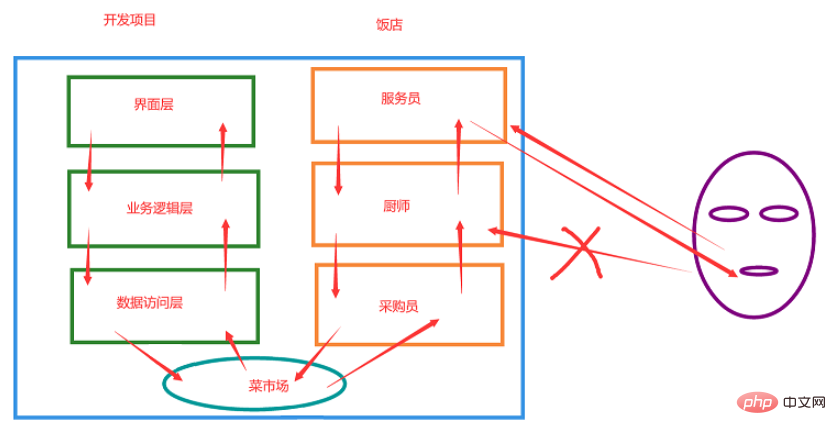
Commonly used SSM framework (understand)
Spring: It is a framework that integrates other frameworks. Its core is IOC and AOP. It consists of more than 20 modules. It provides good solutions in many fields. It is a boss-level existence.
SpringMVC: It is a part of the Spring family Member. Specifically used to optimize the controller (Servlet). Provides extremely simple data submission, data carrying, page jump and other functions.
MyBatis: is a framework of the persistence layer .Used to optimize database access. Focus on sql statements. Greatly simplify JDBC access.
What is the framework
It is a semi-finished software.
Resolve all common and repetitive functions to help the program develop quickly and efficiently.
It is reusable and extensible.
It allows Our development is simpler and faster, focusing only on the development of main logic
What is the Mybatis framework
MyBatis is originally an open source project iBatis of apache. In 2010, this project was moved from the apache software foundation to google code and renamed it MyBatis. Migrated to Github in November 2013, the latest version is MyBatis 3.5.7, and its release time is April 7, 2021.
(Key point, you may ask in the interview!!!) MyBatis has completed the optimization of the data access layer. It focuses on sql statements. It simplifies the cumbersome access mechanism of JDBC in the past.
Add framework Steps
Add dependencies
Add configuration file: The pom.xml file is the core configuration file of Mybatis
Specific steps:
1. Create a new database and create a table
#创建数据库ssm CREATE DATABASE ssm DEFAULT CHARSET utf8; #使用(打开)ssm数据库 use ssm; #创建表student CREATE TABLE `student` ( `id` int(11) AUTO_INCREMENT primary key , `name` varchar(255) DEFAULT NULL, `email` varchar(255) DEFAULT NULL, `age` int(11) DEFAULT NULL ) ENGINE=InnoDB DEFAULT CHARSET=utf8; insert into student(name,email,age) values('张三','zhangsan@126.com',22); insert into student(name,email,age) values('李四','lisi@126.com',21); insert into student(name,email,age) values('王五','wangwu@163.com',22); insert into student(name,email,age) values('赵六','zhaoliun@qq.com',24); select * from student;
2. Create a new maven project
Select the quickstart template
Create a new empty project, To create a module, select the maven project, select the quicstart template to create a java project
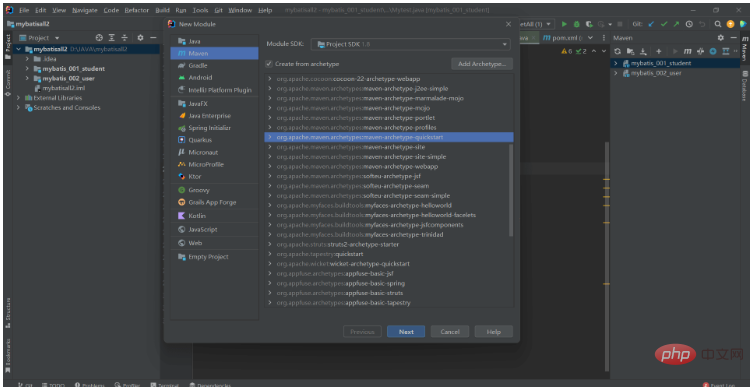
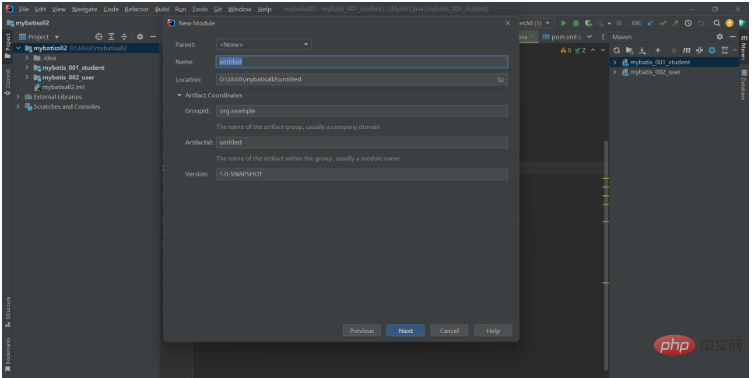
3. Modify the directory
Add the missing directory , Modify directory attributes
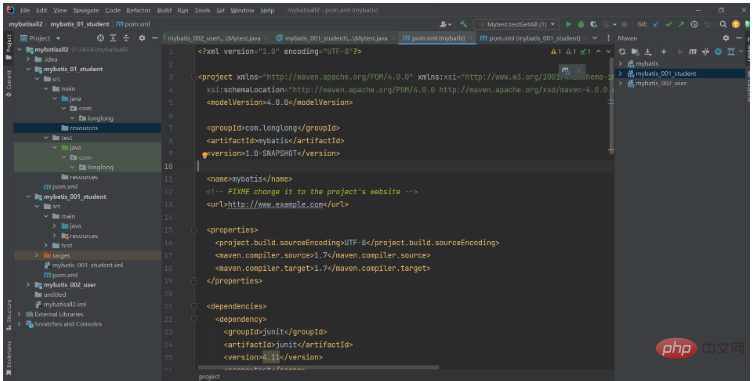
Note here: the newly created folder should also be used as a resource, pay attention to the color of the newly added file rescoures
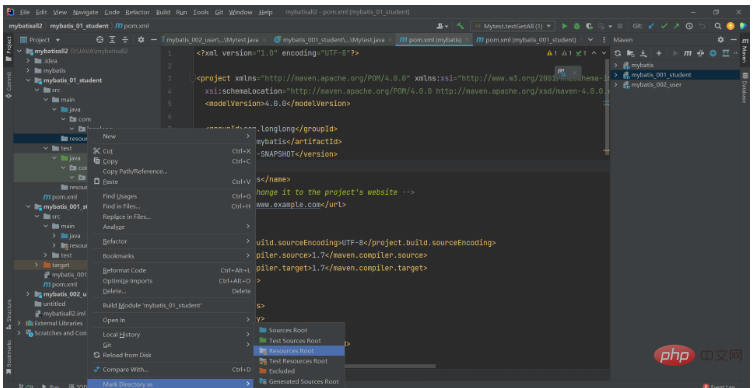
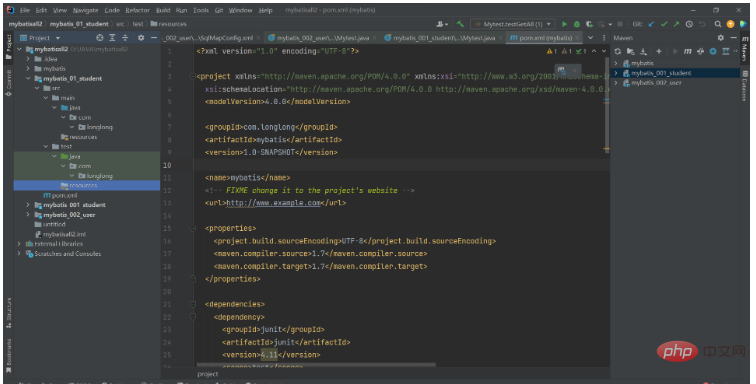
<!--添加MyBatis框架的依赖-->
<dependency>
<groupId>org.mybatis</groupId>
<artifactId>mybatis</artifactId>
<version>3.5.6</version>
</dependency>
<!--添加mysql依赖-->
<dependency>
<groupId>mysql</groupId>
<artifactId>mysql-connector-java</artifactId>
<version>5.1.32</version>
</dependency>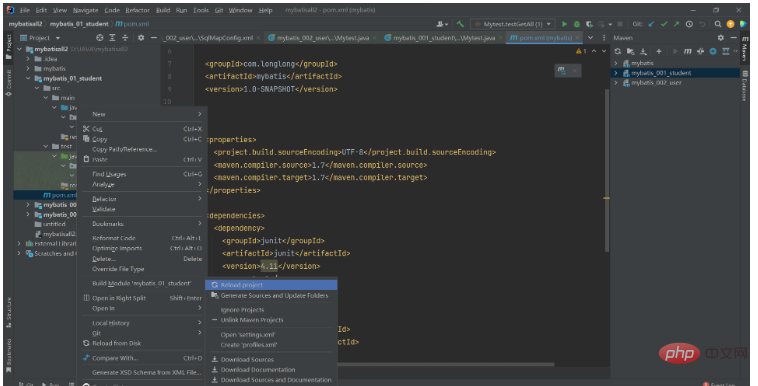
<!--添加资源文件的指定-->
<build>
<resources>
<resource>
<directory>src/main/java</directory>
<includes>
<include>**/*.xml</include>
<include>**/*.properties</include>
</includes>
</resource>
<resource>
<directory>src/main/resources</directory>
<includes>
<include>**/*.xml</include>
<include>**/*.properties</include>
</includes>
</resource>
</resources>
</build>4.0.0 com.longlong mybatis 1.0-SNAPSHOT UTF-8 1.7 1.7 <!--添加MyBatis框架的依赖--> <dependency> <groupId>org.mybatis</groupId> <artifactId>mybatis</artifactId> <version>3.5.6</version> </dependency> <!--添加mysql依赖--> <dependency> <groupId>mysql</groupId> <artifactId>mysql-connector-java</artifactId> <version>5.1.32</version> </dependency> junit junit 4.11 test src/main/java **/*.xml **/*.properties src/main/resources **/*.xml **/*.properties
The above is the detailed content of Java Mybatis framework application example analysis. For more information, please follow other related articles on the PHP Chinese website!

Hot AI Tools

Undresser.AI Undress
AI-powered app for creating realistic nude photos

AI Clothes Remover
Online AI tool for removing clothes from photos.

Undress AI Tool
Undress images for free

Clothoff.io
AI clothes remover

Video Face Swap
Swap faces in any video effortlessly with our completely free AI face swap tool!

Hot Article

Hot Tools

Notepad++7.3.1
Easy-to-use and free code editor

SublimeText3 Chinese version
Chinese version, very easy to use

Zend Studio 13.0.1
Powerful PHP integrated development environment

Dreamweaver CS6
Visual web development tools

SublimeText3 Mac version
God-level code editing software (SublimeText3)

Hot Topics
 1664
1664
 14
14
 1423
1423
 52
52
 1321
1321
 25
25
 1269
1269
 29
29
 1249
1249
 24
24
 Break or return from Java 8 stream forEach?
Feb 07, 2025 pm 12:09 PM
Break or return from Java 8 stream forEach?
Feb 07, 2025 pm 12:09 PM
Java 8 introduces the Stream API, providing a powerful and expressive way to process data collections. However, a common question when using Stream is: How to break or return from a forEach operation? Traditional loops allow for early interruption or return, but Stream's forEach method does not directly support this method. This article will explain the reasons and explore alternative methods for implementing premature termination in Stream processing systems. Further reading: Java Stream API improvements Understand Stream forEach The forEach method is a terminal operation that performs one operation on each element in the Stream. Its design intention is
 PHP: A Key Language for Web Development
Apr 13, 2025 am 12:08 AM
PHP: A Key Language for Web Development
Apr 13, 2025 am 12:08 AM
PHP is a scripting language widely used on the server side, especially suitable for web development. 1.PHP can embed HTML, process HTTP requests and responses, and supports a variety of databases. 2.PHP is used to generate dynamic web content, process form data, access databases, etc., with strong community support and open source resources. 3. PHP is an interpreted language, and the execution process includes lexical analysis, grammatical analysis, compilation and execution. 4.PHP can be combined with MySQL for advanced applications such as user registration systems. 5. When debugging PHP, you can use functions such as error_reporting() and var_dump(). 6. Optimize PHP code to use caching mechanisms, optimize database queries and use built-in functions. 7
 PHP vs. Python: Understanding the Differences
Apr 11, 2025 am 12:15 AM
PHP vs. Python: Understanding the Differences
Apr 11, 2025 am 12:15 AM
PHP and Python each have their own advantages, and the choice should be based on project requirements. 1.PHP is suitable for web development, with simple syntax and high execution efficiency. 2. Python is suitable for data science and machine learning, with concise syntax and rich libraries.
 PHP vs. Other Languages: A Comparison
Apr 13, 2025 am 12:19 AM
PHP vs. Other Languages: A Comparison
Apr 13, 2025 am 12:19 AM
PHP is suitable for web development, especially in rapid development and processing dynamic content, but is not good at data science and enterprise-level applications. Compared with Python, PHP has more advantages in web development, but is not as good as Python in the field of data science; compared with Java, PHP performs worse in enterprise-level applications, but is more flexible in web development; compared with JavaScript, PHP is more concise in back-end development, but is not as good as JavaScript in front-end development.
 PHP vs. Python: Core Features and Functionality
Apr 13, 2025 am 12:16 AM
PHP vs. Python: Core Features and Functionality
Apr 13, 2025 am 12:16 AM
PHP and Python each have their own advantages and are suitable for different scenarios. 1.PHP is suitable for web development and provides built-in web servers and rich function libraries. 2. Python is suitable for data science and machine learning, with concise syntax and a powerful standard library. When choosing, it should be decided based on project requirements.
 PHP's Impact: Web Development and Beyond
Apr 18, 2025 am 12:10 AM
PHP's Impact: Web Development and Beyond
Apr 18, 2025 am 12:10 AM
PHPhassignificantlyimpactedwebdevelopmentandextendsbeyondit.1)ItpowersmajorplatformslikeWordPressandexcelsindatabaseinteractions.2)PHP'sadaptabilityallowsittoscaleforlargeapplicationsusingframeworkslikeLaravel.3)Beyondweb,PHPisusedincommand-linescrip
 PHP: The Foundation of Many Websites
Apr 13, 2025 am 12:07 AM
PHP: The Foundation of Many Websites
Apr 13, 2025 am 12:07 AM
The reasons why PHP is the preferred technology stack for many websites include its ease of use, strong community support, and widespread use. 1) Easy to learn and use, suitable for beginners. 2) Have a huge developer community and rich resources. 3) Widely used in WordPress, Drupal and other platforms. 4) Integrate tightly with web servers to simplify development deployment.
 PHP vs. Python: Use Cases and Applications
Apr 17, 2025 am 12:23 AM
PHP vs. Python: Use Cases and Applications
Apr 17, 2025 am 12:23 AM
PHP is suitable for web development and content management systems, and Python is suitable for data science, machine learning and automation scripts. 1.PHP performs well in building fast and scalable websites and applications and is commonly used in CMS such as WordPress. 2. Python has performed outstandingly in the fields of data science and machine learning, with rich libraries such as NumPy and TensorFlow.




